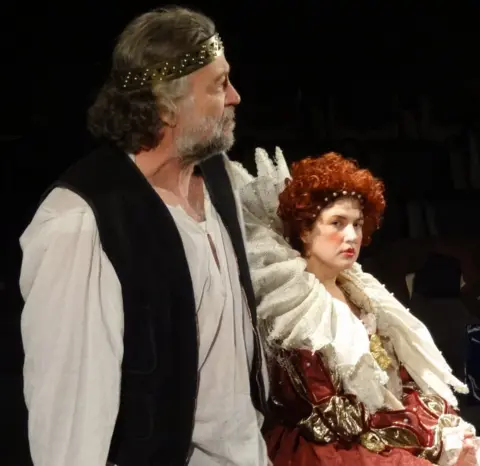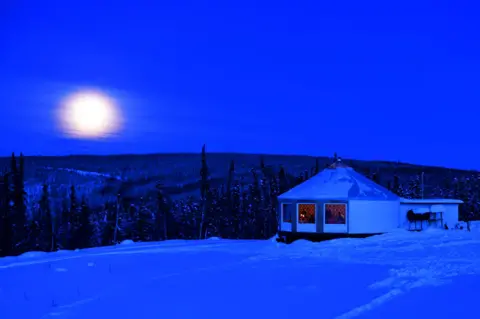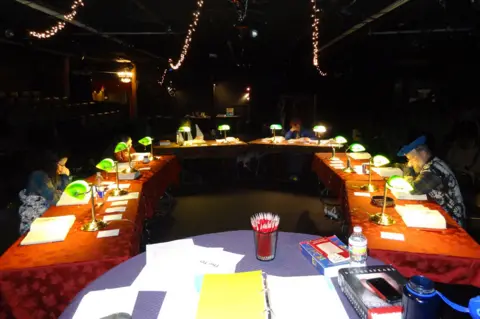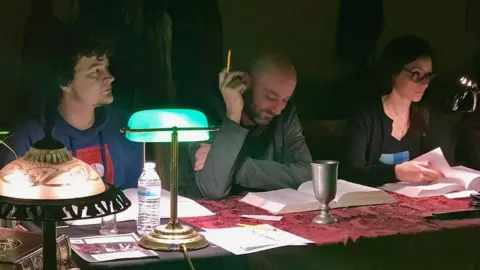A winter's tale for Alaska's Shakespeare fans
 Fairbanks Shakespeare Theatre Company
Fairbanks Shakespeare Theatre CompanyReading Shakespeare plays around the clock is one way to make Alaska's long and dark winters fly past, writes James Bartlett.
There's two foot of snow outside and it's barely 15 degrees, but Carey Seward dismisses any talk of the cold - she's only got a few days to go before a major production opens to the public.
And it's as unique as the theatre company that she manages.
Seward, 38, was born and raised in Fairbanks, a city that's called the "Golden Heart" of Alaska and is home to the most northerly Shakespearean theatre company in the world.
"Scientists putting on plays at Antarctic research stations? That doesn't count!" she laughs.
She has a point. This year the theatre is celebrating Bard-A-Thon XX, their unique annual continual reading of the 38 canonical plays of William Shakespeare. "And we're also doing Sonnets at 7pm," she adds.
The Bard-A-Thons were envisioned as a way for the company to bring Shakespeare's work to a wider community audience, and their timing during Alaska's notoriously long, dark and difficult winter is no coincidence.
"We try to be like a candle in the dark, welcoming the community in."
As for the performers, they can be anyone and everyone. "Sometimes we have a 13-year-old playing Hamlet or an older lady playing Juliet: it's always different, and there's a magic in the newness."
Whether the actors are amateur or professional, young or old, the plays are read on a near round-the-clock schedule for 10 days, and locals, students, polar scientists, residents at the nearby retirement community and even the company's own actors have to sign up for the play they want to read, and the character they want to perform.
 Getty Images
Getty Images"We've had Japanese tourists accidentally wander in after looking at the Aurora Borealis, and then stay to read. We also have lots of people who phone in - this year we're expecting South Korea, Scotland and the Bahamas to join us."
Seward's passion is obvious when she recalls the time that members of the Royal Shakespeare Company called in to read, and also when some of the public schools far out in the bush took part in a phone reading.
In advance of the event she also contacts former members of the Fairbanks Shakespeare Theatre company to ask them to "come home for a moment" and perform in the Bard-A-Thon, no matter where in the world they are.
The whole event is streamed live online - audio only - from the Raven Landing Community Center, and the set-up in the room is quite simple: a circle of desks with green "banker" lights and a copy of the weighty Riverside Works on each, so that everyone is literally on the same page.
The volunteer stage manager and daily facilitators try to keep things running smoothly, and hand out instruments and costumes that the temporary actors - and audience members - can wear or play.
"There's even a bearskin," says Seward, referring to the notable moment in The Winter's Tale, "and we encourage people to make sound effects, rather than use a CD."
 Fairbanks Shakespeare Theatre Company
Fairbanks Shakespeare Theatre CompanyThe event is free and people can come and go as they please, but it's always a worry that no one will turn up. So far, it's never happened.
"We have 20 diehards who come every year," says Seward.
Locals especially make the effort to leave their often isolated or heavily snowed-in homes to be part of the festival, and many bring pizza, donuts or pot luck food with them, though there's always soup or chilli on the go.
The event - and the small pop-up gift shop - raise funds for the company's others programmes like youth theatre camps, and performing in Boys' and Girls' clubs, assisted-living residences, correctional facilities, homeless shelters, and youth detention centres.
Perhaps unsurprisingly, Hamlet is the most popular play and the most coveted role, but no matter how many sign up everyone gets to read, even if it ends up being just a few lines.
"We once had a man read the whole of Coriolanus at four in the morning," recalls Seward, who admits that some Shakespeare plays are less popular (the "History" plays for example, and some of the longer ones like Measure for Measure).
This has led to some re-jigging, and this year 8am-3pm is reserved for educational sessions, with the readings proper starting a student-friendly 3pm, and the more popular plays (what Seward calls "the biggies") scheduled for 7.30pm every night.
Also, the "graveyard shift" from midnight to 8am has been dropped for a couple of the days, though that's in part because Bruce Rogers, the man behind the Bard-A-Thon, won't be here this year: he's directing a play in Wisconsin.
"When he's in town for the Bard-A-Thons he's here for every minute of all of them," says Seward. "There used to be sleeping bags at our other venue and I've heard he occasionally used them, but I think it's just a rumour."
Reached in Wisconsin, Rogers explains that he came up with the idea for Bard-A-Thon when he was travelling around America on a month-long unlimited Greyhound bus ticket.
"All I took with me was a copy of the Riverside Shakespeare," he says, "and I read it all. You can only really understand (Shakespeare's) genius if you read them all."
 Fairbanks Shakespeare Company
Fairbanks Shakespeare CompanyHe returned to Fairbanks with a zeal for the Bard's works, "but there was no money to put on a play," he recalls, "so we just thought: why don't we just read them all out loud?"
Seward recalls seeing her first Shakespeare play in Fairbanks. "My neighbour was playing 'Mustardseed' in A Midsummer Night's Dream so I went along, and I was hooked," she says. "I started auditioning for the live shows."
This year "Queen Elizabeth I" in full costume will conduct the opening ceremony, which will feature local schoolchildren that Seward has taught to perform Act 1 of Macbeth. Then it's on to the first play, The Two Gentlemen of Verona.
Seward admits that her own favourite play has changed frequently over the two decades, but that she's hoping to complete the canon on this anniversary.
"I just saw Sophie Okonedo and Ralph Fiennes in Antony and Cleopatra at the National Theatre. I just adored it, and now I want to read some of 'Cleopatra' this year."
Bard-A-Thon XX runs from February 8-17
